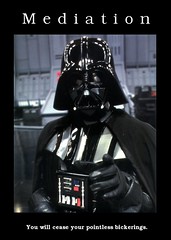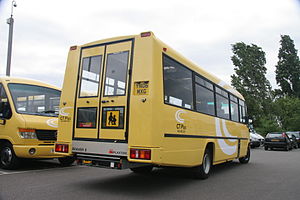 Image via Wikipedia
Image via Wikipedia
I was giving some thought to my Christmas message. I will be spending the next ten days or so with my family, so I thought a big message would be impressive before I left. I had even thought about writing a parody challenging the increasingly commercial nature of Christmas. The possibilities were exciting...just imagine..."I'm Dreamin' of a White X-box"... This could have been fun!
I had written parodies before. Going back to high school when I penned "I've Got a Black Magic Marker" to that amazing Santana tune, "Black Magic Woman." So there was some hope. (Remember Cubs fan... delusional optimism..., etc.)
Luckily you were spared from this ordeal. A colleague wrote a parody that is way better and shared it with me. The imagery is impressive. But first the legal disclaimer: this is not my work and the opinions expressed are solely those of the author. The characters are fictional and any resemblance to any person, living or dead, is purely coincidental. No animals were harmed in the making of this post. (I could go on all day, but for additional legalese, please see the permanent disclaimer on the lefthand side of the blog!)
Here is a new version of Twas The Night Before Christmas, with a distinct special education due process hearing flavor:
Twas the night before [insert holiday of your choice],
When all through the house
Not a creature was stirring
Just a hearing officer* and a mouse.
The exhibits were hung by the chimney with care
In hopes that some insight would soon be found there.
The HO family was nestled all snug in their beds
While visions of [insert holiday symbol of your choice] danced in their heads.
And the HO in her** jammies, with draft Findings in her lap,
Knew that the pesky decision due date would preclude a nice nap.
When out on the lawn there arose such a clatter
The HO sprang from her desk chair to see what was the matter.
Away to the window, the HO flew like a flash,
Tore open the shutters and threw up the sash!
The moon on the breast of the new-fallen snow
Gave the luster of mid day to objects below.
When, what to the HO’s wondering eyes should appear,
But a miniature sleigh and eight attorneys (those dears!)
With a mind like a steel trap, so lively and quick,
The HO knew in a moment it must be a trick!
More rapid than eagles those attorneys they came
And the HO whistled, and shouted, and called them by name!
“Now Susan! Now Mary! Now Lisa ! (and other vixen)
Now William! Now James! Now Robert! (but no one named Blitzen)
To the top of the porch! To the top of the wall!
Now dash away! Dash away! Dash away all!
As dry leaves that before the wild hurricane fly,
When they meet with an obstacle, mount to the sky.
So up to the house-top the attorneys they flew,
With a sleigh full of extension requests, and legal arguments too.
And then, in a twinkling, the HO heard on the roof
The prancing and pawing of each little attorney hoof.
As the HO drew in her head, and was turning around,
Down the chimney the attorneys came with a bound.
They were dressed all in business suits, from their heads to their foot
And their clothes were all tarnished with ashes and soot.
A bundle of extension requests they had flung on their back,
And they looked like a peddler, just opening her pack.
Their eyes-how they twinkled! Their dimples, how merry!
Their cheeks were like roses, their noses like cherries!
Their droll little mouths were drawn up like a bow,
And the pallor of their faces was as white as the snow.
The remnants of an adult beverage they swished around in their teeth,
As the alcohol vapors encircled their heads like a wreathe.
Their sweet earnest faces and flat little belly,
Were covered with ashes and soot, but yet not the least bit smelly!
They were cordial and amicable, exuding great class and great wealth,
At the pinnacles of their careers, the picture of health!
A wink of an eye and a twist of a head,
Soon gave the HO to know she had nothing to dread.
The attorneys spoke not a word, but returned straight to their work,
Engaging in “consensual rescheduling”, then turning with a jerk
They struck a compelling, attorney-like pose,
Then gave a nod to the HO, and up the chimney they rose!
They sprang to their sleigh, to the team gave a whistle
And away they all flew like the down of a thistle.
But the HO heard them exclaim, ‘ere they drove out of sight,
We all want extensions, dear HOs, so for the HOs……….
A Good Night!
· *The generic use of “HO”, rather than a name, is used to protect the confidentiality of the HO.
· ** It is this Author’s preference to use the pronoun “she” or “her” rather than to engage in the cumbersome she/he, her/him dichotomy or to succumb to the traditional, sexist use of “him”.
http://specialeducationlawblog.blogspot.com/2008/12/merry-christmas.html http://specialeducationlawblog.blogspot.com/2010/12/christmas-message-true-story.html
 Image via Wikipedia
Image via Wikipedia
 Image via Wikipedia
Image via Wikipedia
 Image by TomNatt via Flickr
Image by TomNatt via Flickr Image by alancleaver_2000 via Flickr
Image by alancleaver_2000 via Flickr Image via Wikipedia
Image via Wikipedia Image via Wikipedia
Image via Wikipedia Image by gholmes via Flickr
Image by gholmes via Flickr Image via Wikipedia
Image via Wikipedia Image via Wikipedia
Image via Wikipedia Image via Wikipedia
Image via Wikipedia Image via Wikipedia
Image via Wikipedia Image via Wikipedia
Image via Wikipedia Image via Wikipedia
Image via Wikipedia Image via Wikipedia
Image via Wikipedia Image by Suchana Seth via Flickr
Image by Suchana Seth via Flickr Image via Wikipedia
Image via Wikipedia